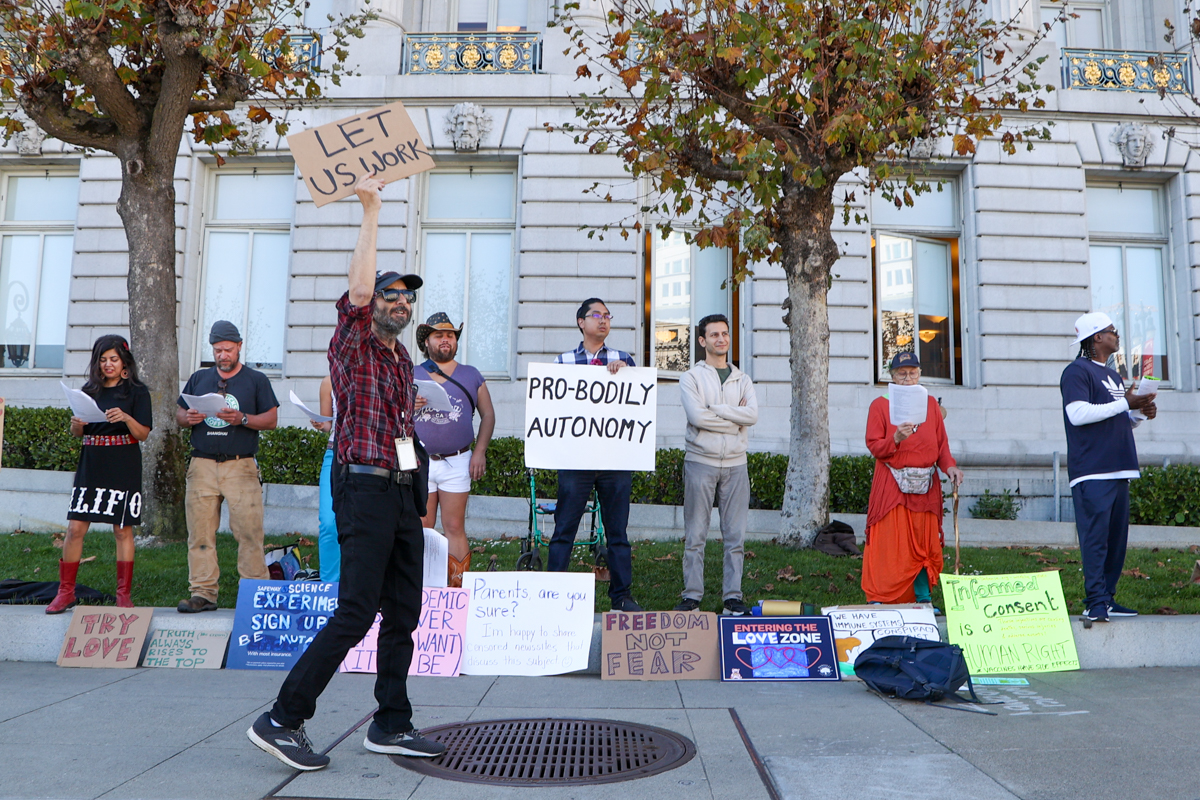You might think a guy like Rob Geller would support the City and County of San Francisco’s vaccine mandate for employees. He is, after all, a 23-year-veteran of the Department of Public Health, an agency that has vigorously championed COVID-19 vaccines since they first came online in December of 2020.
But Geller hasn’t been jabbed since 1978, and the way he tells it, attempting to ward off disease with a deactivated virus or lab-grown strands of mRNA runs counter to his personal philosophy.
“I just feel like God provides for us,” Geller said at a weekly rally in front of City Hall, where around 20 ardent adversaries of the mandate join Geller every Tuesday to sing songs in defiance of what they believe to be a gross governmental overreach.
“I really think people need to just take care of their immune systems,” Geller said. “Instead of yelling at people, we’re singing at them with a smile.”
Geller, who counts himself as a member of the “Sane Franciscans”—a local activist group opposed to vaccine mandates—originally sought exemption from his employer’s COVID requirement on religious grounds.
His request was denied. California has some of the tightest restrictions in the country when it comes to religious or philosophical exemptions to standard vaccines required of schoolchildren.
As far as medical exemptions go, San Francisco is following federal guidelines, which require applicants to meet a set of predetermined standards for a reasonable accommodation, according to Mawuli Tugbenyoh, chief of policy for the city’s department of human resources.
Those guidelines, outlined on the CDC’s website, say that a person may qualify for a medical exemption if they either have a severe allergic reaction to the first dose or they have a known allergy to an ingredient in the vaccine.
If an employee doesn’t meet those requirements, Tugbenyoh said, the city won’t be making an exception. Full stop.
“We aren’t going to displace vaccinated employees,” Tugbenyoh said, explaining that bringing those with and without the shot together would require social distancing measures and other accommodations that just aren’t realistic—especially considering “only a handful” of city employees remain unvaccinated: 622 of the 34,044 city’s employees have yet to comply with the mandate, Tugbenyoh said.
Geller is now holding out hope that a lawsuit, brought against the City and County of San Francisco by another group known as the SF Freedom Alliance, will prevail.
The lawsuit, which was initially filed late October, contends that San Francisco’s mandate, which went into effect on Nov. 1, violates the Due Process Clause of the 14th Amendment to the United States Constitution. The clause, which prohibits state and local governments from depriving persons of “life, liberty or property without due process of law,” is often cited by opponents of new legislation.
Plaintiffs in the case, United SF Freedom Alliance vs the City and County of San Francisco, include employees from the San Francisco Fire Department, the San Francisco Recreation and Parks Department, the San Francisco Municipal Transportation Agency, the Sheriff’s Office and the San Francisco Police Department.
Unfortunately for Geller, Dorit Reiss, the chair of litigation at UC Hastings Law, said that the plaintiffs in this lawsuit are unlikely to win the day. Reiis, who is also a member of the Vaccine Working Group—a group of legal professionals working to “address key policy challenges associated with the testing and distribution of vaccines”— said the Freedom Alliance’s complaint will probably fail because it hinges on arguments against the science that backs vaccines. Reiis noted that the city has precedent on its side: A recent Texas ruling, for example, upheld the right for employers to mandate vaccines for their employees.
“What they’re claiming is, ‘You’re infringing on our liberty by requiring us to vaccinate for the job without a reasonable basis’ … The problem with that argument is that it’s only reasonable if you accept their claims that tried to challenge the science,” Reiis said.
The lawsuit asserts that asymptomatic individuals infected with COVID-19 do not spread the virus, hospitals are inflating the case and death count, and that the vaccine presents a “significant level” of risk for physical injury.
“I would be surprised if this lawsuit goes anywhere, just because it’s not well argued,” Reiss said.
And so, while many of his colleagues are returning to the office, Geller continues to work from home. What’s more, his hours have been cut nearly in half as a result of his stance, and he worries that his job may be on the chopping block. Geller and the rest of the unvaccinated city employees are on administrative leave until their due process hearing takes place, according to the San Francisco department of human resources.
“I’m not exactly sure what comes next,” said Geller, who currently manages a team of six in the DPH’s behavioral health department as a patient account supervisor. “I’m not allowed to go into my office right now because I’m deemed to be too dangerous … It kind of hurts.”
